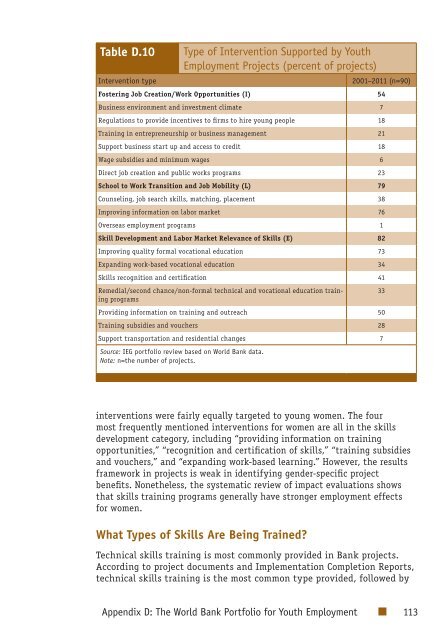- Page 5 and 6:
Youth EmploymentProgramsAn Evaluati
- Page 8 and 9:
The Bank’s Impact Evaluations on
- Page 10 and 11:
LACLICLILMBAMENANEETNGOOECDPADPCRPD
- Page 12 and 13:
IEG management and colleagues provi
- Page 14 and 15:
Youth Employment ChallengesIn gener
- Page 16 and 17:
implemented 12 of the 90 operations
- Page 18 and 19:
Kenya, entrepreneurship training fo
- Page 20 and 21:
• Help countries design intervent
- Page 22 and 23:
support to youth employment program
- Page 24 and 25:
tive rules on hiring and firing as
- Page 26 and 27:
Management Action RecordIEG Finding
- Page 28 and 29:
IEG Findings and ConclusionsIEG Rec
- Page 30 and 31:
IEG Findings and ConclusionsIEG Rec
- Page 33 and 34:
Report to the Board from the Commit
- Page 35:
could have focused more on the lack
- Page 38 and 39:
• Chapter Highlights• High yout
- Page 40 and 41:
and can afford to wait for a better
- Page 42 and 43:
ConsequencesEarly unemployment is s
- Page 44 and 45:
ReferencesBegg, David, Stanley Fisc
- Page 47 and 48:
Chapter 2What Are the World Bank an
- Page 49 and 50:
The strength and openness of the ec
- Page 51 and 52:
Interventions to Address Youth Empl
- Page 53 and 54:
commitments by the International Ba
- Page 55:
Figure 2.2Top 12 Youth Employment I
- Page 58 and 59:
• the substitution effect of bett
- Page 61 and 62:
Chapter 3What Is the Evidence that
- Page 63 and 64:
school dropouts early. Learning opp
- Page 65 and 66:
evaluations on what works best to p
- Page 67 and 68:
Agriculture, Health, Education, Soc
- Page 69:
Holzmann, Robert. 2007. MILES: Iden
- Page 72 and 73:
• Chapter Highlights• The Bank
- Page 76 and 77:
Argentina, Bulgaria, Colombia, and
- Page 78 and 79:
facilitated 69 foreign work contrac
- Page 80 and 81:
awarded vouchers to about 1,000 out
- Page 82 and 83:
• Comparing the interventions ana
- Page 84 and 85:
Hjort, Jonas, Michael Kremer, Isaac
- Page 87 and 88:
Chapter 5Recommendations
- Page 89:
farm self-employment and employment
- Page 92 and 93:
This appendix presents the factors
- Page 94 and 95:
Organization for Standardization (I
- Page 96 and 97:
Box A.3Youth as a Demographic Divid
- Page 98 and 99: Table A.1Types of Youth Employment
- Page 100 and 101: Notes1. This phenomenon could be le
- Page 103 and 104: Appendix BEvaluation Data Sources a
- Page 105 and 106: Identification and Analysis of the
- Page 107 and 108: • Making the labor market work be
- Page 109 and 110: Table B.3ApprovalFYList of Projects
- Page 111 and 112: Table B.3ApprovalFYList of Projects
- Page 113 and 114: Table B.4(I)nvestmentClimate(L)abor
- Page 115 and 116: Table B.6List of Economic Sector Wo
- Page 117 and 118: ment, Private Sector Development, a
- Page 119 and 120: Other evaluations with outcome meas
- Page 121 and 122: Table B.8CountryFranceKenyaMexicoPa
- Page 123 and 124: Table B.8CountryUnitedStatesYouth E
- Page 125 and 126: Table B.8CountryEuropeancountriesLa
- Page 127 and 128: Bidani, Benu, Niels-Hugo Blunch, Ch
- Page 129: Training Replication Sites.” Manp
- Page 132 and 133: Appendix C provides additional info
- Page 134 and 135: Box C.2Global Partnership for Youth
- Page 136 and 137: ReferencesAedo, Cristian, and Ian W
- Page 138 and 139: This appendix provides additional i
- Page 140 and 141: The number of projects and total le
- Page 142 and 143: Figure D.2World Bank Youth Employme
- Page 144 and 145: Table D.5Intervention categoryYouth
- Page 146 and 147: Table D.7Prevalence of Project Obje
- Page 150 and 151: Table D.11Type of Interventions Sup
- Page 152 and 153: Table D.13 Frequently Used Youth Em
- Page 154 and 155: In sum, this portfolio review chapt
- Page 156 and 157: approach in Turkey and Sierra Leone
- Page 158 and 159: This appendix presents a detailed a
- Page 160 and 161: to Finance business line, over a si
- Page 162 and 163: entrepreneurship projects. Investme
- Page 164 and 165: IFC has three types of investments
- Page 166 and 167: Box E.1Africa Schools ProgramIFC su
- Page 168 and 169: Box E.2e4e Initiative for Arab Yout
- Page 170 and 171: 3. IFC’s Advisory Services corpor
- Page 172 and 173: This appendix presents lessons for
- Page 174 and 175: Labor Market RegulationsLabor marke
- Page 176 and 177: to the definition of unemployment b
- Page 178 and 179: In post-conflict zones with small f
- Page 180 and 181: Public works programs in Bank proje
- Page 182 and 183: marginal impact of school-to-work t
- Page 184 and 185: of the program. However, results fo
- Page 186 and 187: • Weak results frameworks on the
- Page 188 and 189: sustainability. Zambia’s TEVET pr
- Page 190 and 191: unemployed youth registered with th
- Page 192 and 193: for Employment and Entrepreneurship
- Page 194 and 195: Note1. The Technical and Vocational
- Page 196 and 197: Ibarraran, Pablo, and David Rosas.
- Page 198 and 199:
World Bank. 2012a. “World Bank an
- Page 200 and 201:
IEG’s Youth Employment Evaluation
- Page 202 and 203:
Figure G.1 Facebook Demographics Ba
- Page 204 and 205:
Figure G.3Results on Rural Employme
- Page 207 and 208:
BibliographyBarrera, Felipe, Paul G
- Page 209 and 210:
———. 2011b. Migration and Rem
- Page 211 and 212:
The World Bank GroupWorking for a W
















